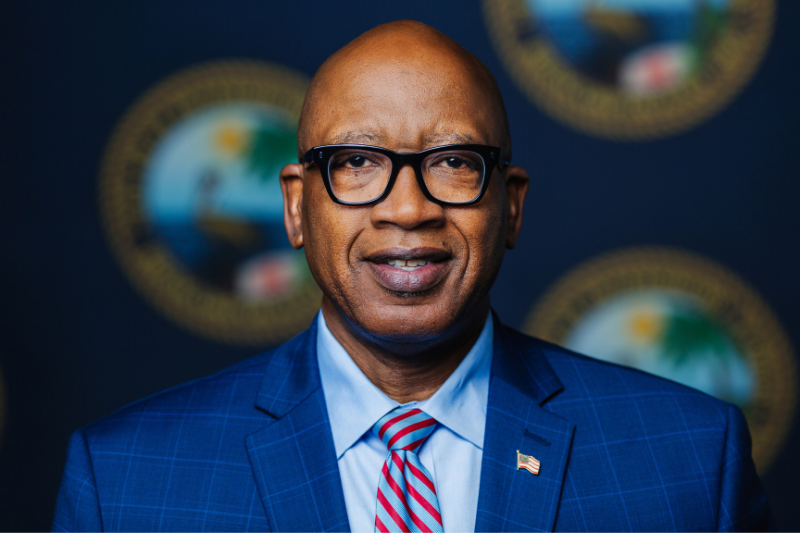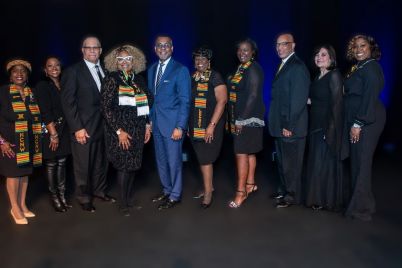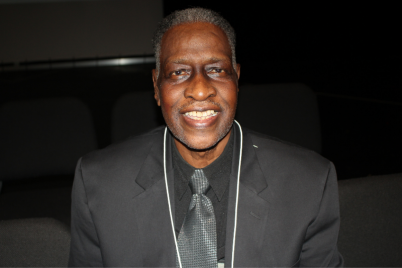Mayor Ken Welch’s response to Faith and Action for Strength Together (FAST) open letter published last month addresses St. Pete housing initiatives.
To the residents of the City of St. Petersburg:
The issue of Affordable Housing has long been my priority as an elected official. On March 21, 2024, Faith and Action for Strength Together (FAST) published an open letter in The Weekly Challenger that ignores my nearly two decades of intentional partnership with FAST and our current state-leading success in developing and preserving affordable housing for those making below-average incomes.
FAST’s letter also questions the importance of housing to my administration. On the contrary, affordable housing has long been an established priority of mine, and working with FAST and others, we have achieved unprecedented levels of local funding and supportive policies.
The Facts
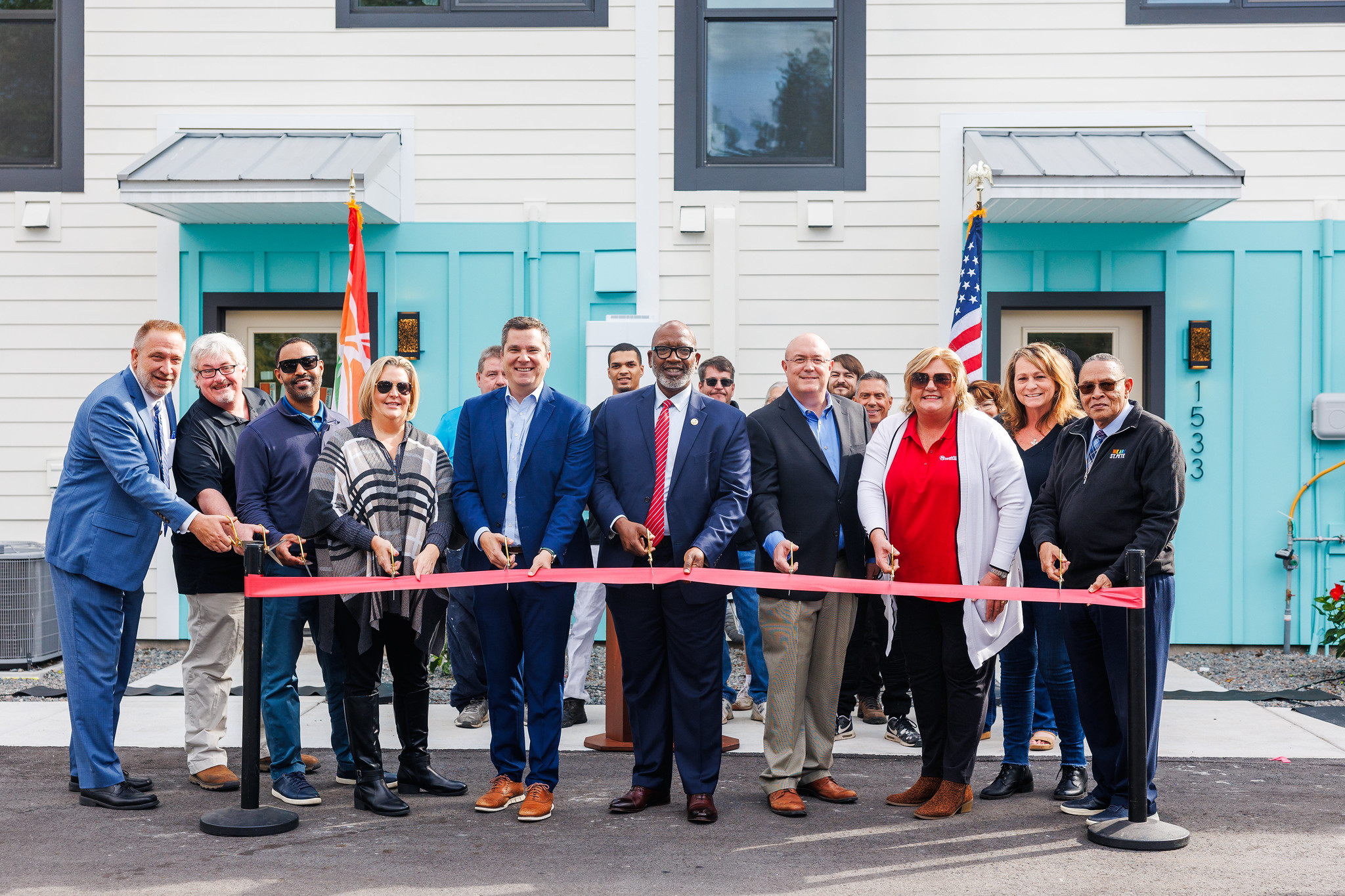
On Jan. 10, Mayor Ken Welch and city staff cut the ribbon on the 11-unit Sixteenth Square Townhomes development.
To say that city leadership is “unmoved” by the housing challenge is frankly deceptive and patently false. It’s especially disappointing when people of “faith,” who have worked with me and other leaders to successfully implement well over $100 million in local affordable housing funding and policies at the county and city levels, are so comfortable making such misleading statements.
But this is not a new phenomenon. Over the past 18 years, I have had several heart-to-heart conversations with Pastor Robert Ward and other FAST leaders regarding the unproductive nature of this approach, which demeans even the most committed elected officials, never rewards success, nor builds partnerships.
I have urged FAST to work collaboratively with elected officials who have shown a commitment – and results – on those issues of mutual concern. My administration is focused on our Governing Principle of Community Impact, and I’ve kept my word on impactful issues like the South St. Pete CRA, the Housing Trust Fund and Penny for Pinellas affordable housing funding.
These funding sources, when leveraged with public and private sector investments, have led to the development, creation, and preservation of more than 10,000 affordable and workforce housing units in our community. Under my chairmanship, the county created the Affordable Housing Trust Fund with $19 million in local funding – a first for our county.
Funding was added through the Penny for Pinellas, including $83 million in 2017 – again, working with FAST to secure that funding. And as mayor, we have increased our 2030 housing goals by more than 1,000 units and dedicated more than $50 million in American Rescue Plan Act, South St. Pete CRA, and other funding to support our Housing Opportunities for All Plan. We’ve also supported several programs to help citizens with home repair, rental assistance, utility assistance, and first-time homeowner programs. The list of our housing programs and funding is extensive, reflecting the real work that we’re doing every day.
The Focus on Affordability
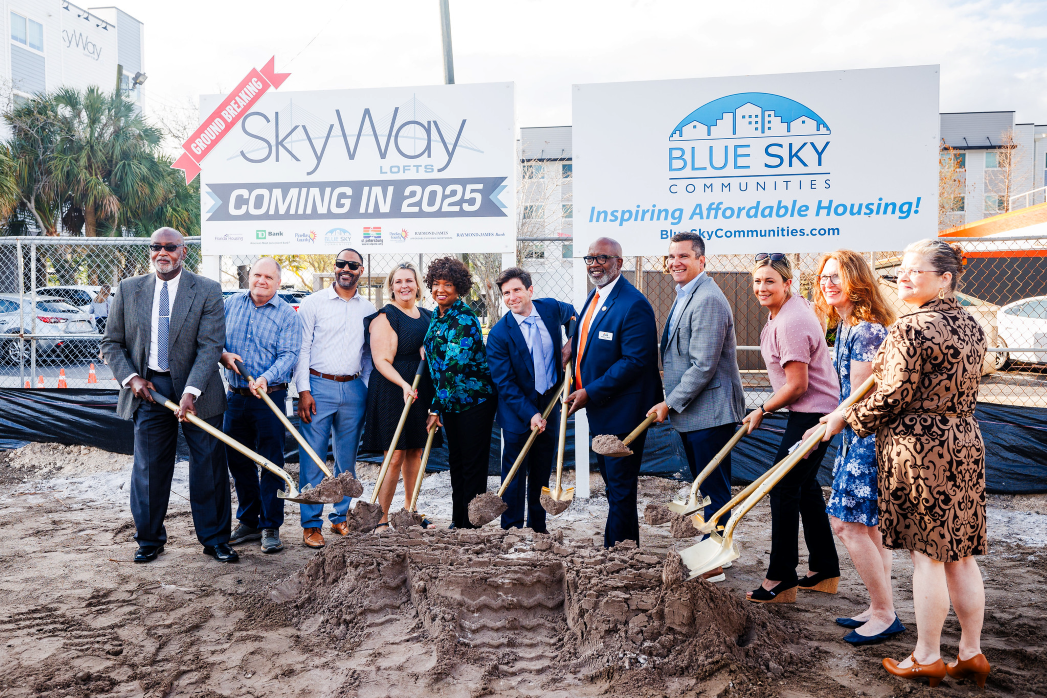
Mayor Ken Welch and his administration broke ground on SkyWay Lofts II, 66 new affordable apartments on March 6.
Since taking office as mayor, members of FAST have approached me individually and collectively to discuss affordable housing in St. Pete with FAST’s specific concern “to make affordable housing a priority for those in our community making 80 percent AMI or less ($48,000/single adult, $69,000/family of four).”
Many FAST members have spoken with me at our City Hall on Tour stops held around the community and at various citywide events. During those conversations, I reminded several of them that they should be aware that we’ve focused on 80 percent AMI since the inception of the Housing Trust Fund in 2006 and that they have been provided reports on several occasions – including recently – showing the emphasis on the development of 80 percent AMI (and lower income) housing under the city’s current plan. To date, 96 percent of the housing completed with city support in the last two years has been for those earning 80 percent AMI and below.
The Meeting
Last December, FAST notified me about their April 30 Nehemiah Action meeting. I personally relayed to Rev. Ward that I would consider it, but before the Nehemiah Action, I requested to meet with FAST’s housing committee members for a collaborative conversation on what new, innovative methods we could partner on with FAST’s member organizations to increase our affordable housing goals and production. The group again turned down the opportunity, demanding that we meet with a large group in one of their houses of worship and attend the Nehemiah Action.
The Invitation to Collaborate
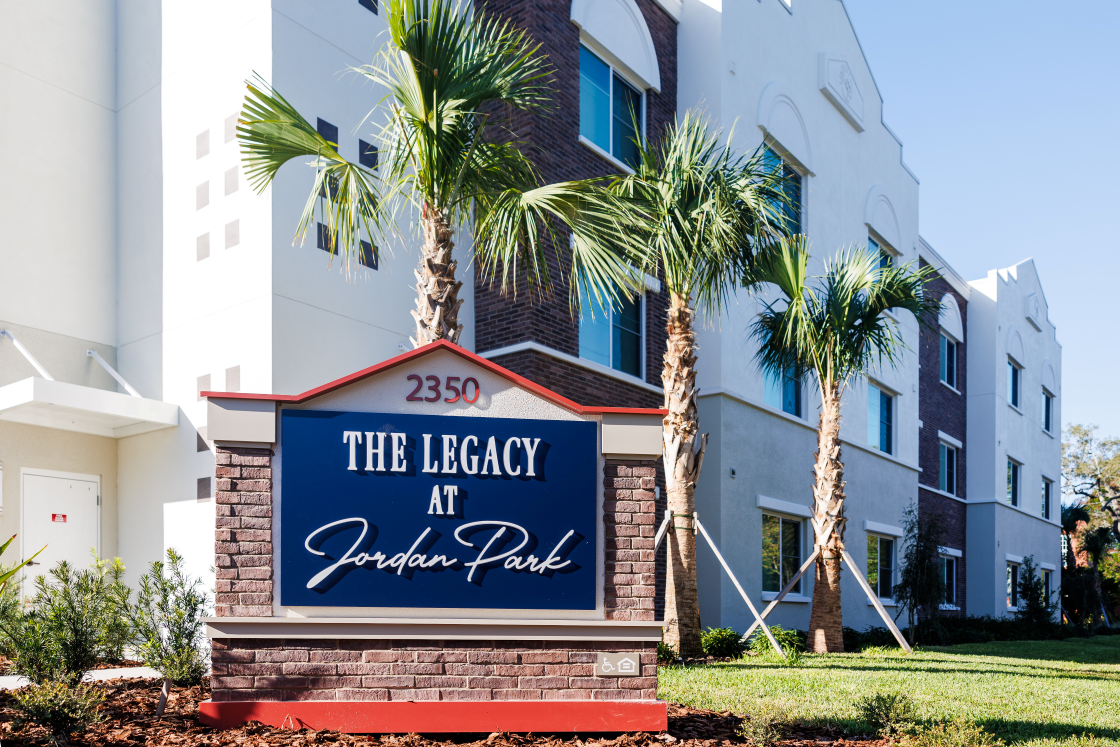
The Legacy at Jordan Park is a cutting-edge, 60-unit, senior midrise building that started moving residents last October.
No one entity can affect meaningful change, especially in the affordable housing space. Reaching or exceeding 100 percent of our housing goals will only be possible through the strong public-private partnerships that the city enjoys with the county, developers, banks, and other community stakeholders.
Faith communities can play an important role in the development of affordable housing as well. Not just by reminding those in elected office of our moral obligation to serve those with average or lower incomes, but in the actual work — the physical development of this much-needed housing. As a person of faith myself, I cherish the scripture that reminds us that “faith without works is of little impact” (“dead” in the KJV).
Faith-Based Housing Initiative
We can take steps to have a more significant impact in collaboration with our faith communities. The following is a model that I hoped to discuss with the FAST housing leaders, but since multiple requests to meet were not accepted, I will present it here:
When the Florida Legislature reconvenes, I will be asking for the consideration of legislation to empower faith communities to develop affordable housing on their own property, also known as Yes In God’s Backyard or YIGBY legislation. I will also continue that advocacy at the federal level, endorsing the passage of the Yes in God’s Backyard Act, sponsored by Sen. Sherrod Brown, Chairman of the Senate Committee on Banking, Housing, and Urban Affairs.
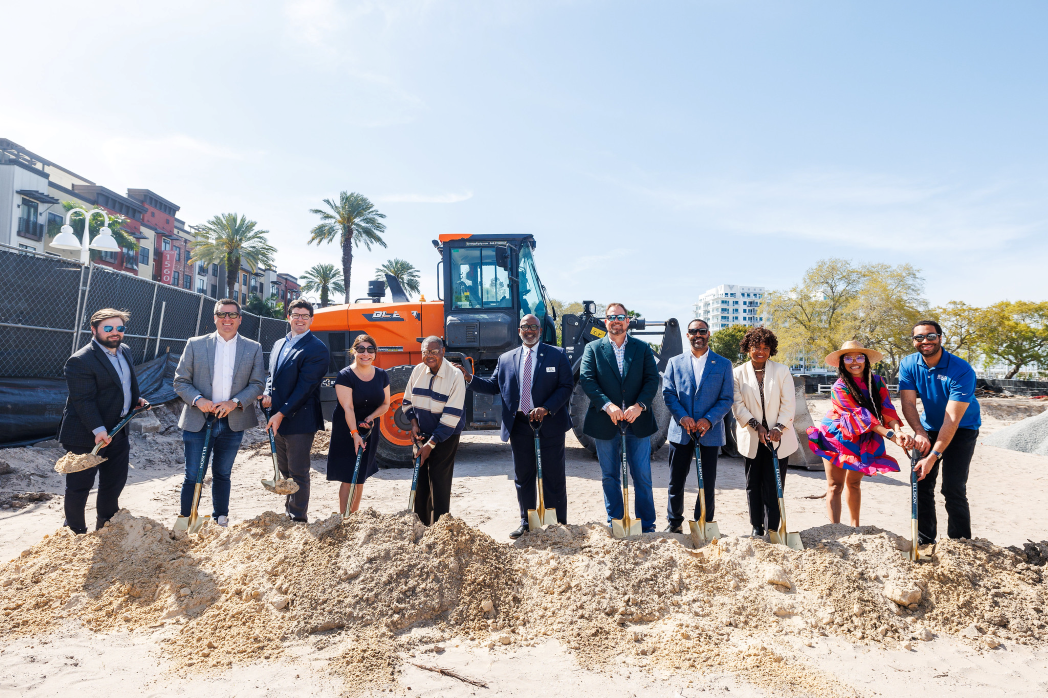
Mayor Ken Welch, city staff and community members attended the groundbreaking ceremony in February for The Central, a mix-use redevelopment project that includes 42 workforce housing units.
Here in St. Petersburg, I invite FAST and all faith organizations to partner with the city to develop a Faith-Based Housing Initiative, with the goal of identifying land and/or properties that the faith community can devote to the cause of increasing the number of affordable housing units available in our community.
The city has experienced recent success with this model through the vision of Pastor Oscar Banks and Palm Lake Christian Church. Pastor Banks, who has spoken on FAST’s behalf at city council, has partnered with Norstar developers to utilize church land to develop affordable housing. The city anticipates contributing financially to this project. Our housing team is also exploring a similar scenario with First United Methodist downtown. This model can indeed be replicated, given the large amounts of land and properties that FAST and other faith-based organizations (FBOs) own.
This approach is gaining traction in communities across our nation. By leveraging unused or underutilized church properties to develop affordable housing, FBOs can do more to actively address the critical shortage of affordable housing that they rightly advocate for. This initiative advocates for and directly supports the development of stable, affordable housing. By uniting with local governments, FBOs can navigate zoning regulations and funding opportunities more effectively, creating a sustainable model that benefits our entire community.
My administration has an open-door policy, focusing on progress in this critical area. Again, I urge FAST to consider meeting to discuss this proposal. It has true potential! In the meantime, we will continue looking for ways to meet and hopefully exceed our affordable and workforce housing goals for St. Petersburg. It is now, and will always be, a priority for my administration. We will continue to fulfill that commitment through our work.
We Are St. Pete,
Mayor Kenneth T. Welch
Recap of St. Pete housing initiatives
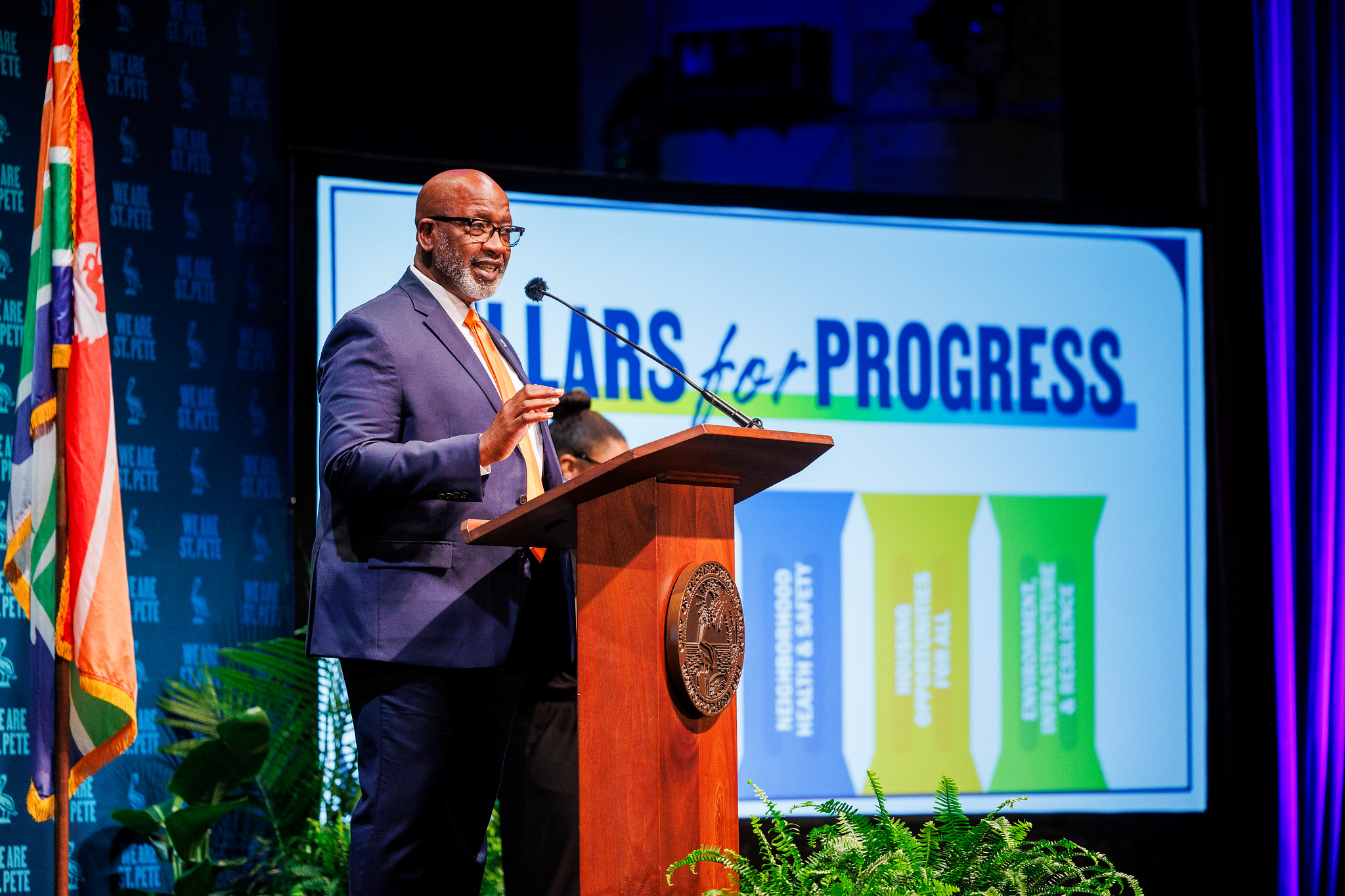
At the State of the City address in January, Mayor Ken Welch shared the city’s 2023 Progress Report and provided an extensive update on the “Housing Opportunities for All” Pillar.
In 2023, we increased the target numbers in our Housing Opportunities for All Plan by 1,050 across six categories, elevating the overall target number for the entire plan to 7,800.
The plan’s six housing opportunities will:
- Create and preserve multi-family homes
- Add non-subsidized workforce density bonus units
- Add new-construction additional dwelling units (ADUs)
- Provide single-family home purchase assistance
- Add new-construction single-family affordable homes and
- Provide homeowner assistance to preserve single-family homes.
At our State of the City this past January, we shared our 2023 Progress Report, which provided an extensive update on each Pillar for Progress. The following highlights our “Housing Opportunities for All” Pillar. For our residents facing housing challenges, the city:
- Pursued and received $5.9M reallocated Emergency Rental Assistance funding to continue to provide financial assistance to eligible renter households and construct new affordable rental housing units.
- Provided $2.5M in assistance to non-profit agencies for Tenant-Based Rental assistance, homeless prevention, rapid re-housing, Homeless Management Information System (HMIS), emergency shelters, and program operations, which assisted nearly 7,000 people.
- Allocated $2.13M to 22 social service programs to address the needs of individuals and families who are living unhoused, at risk of losing their housing, domestic violence survivors, or unaccompanied youth needing assistance.
- Funded more than $653,000 in non-profit facility rehabilitation, improving the conditions for 2,096 individuals.
- Awarded $578K in Social Action Funding grants to 10 social service agencies that provide homeless services and/or homeless prevention services.
- Created “St. Petersburg’s Guide for Renters,” which provides resources to assist renters with budgeting for housing, navigating lease agreements, and inspections.
- Created a Renters Map built specifically for renters to research prior eviction, tenant bill of rights, and rental unit maintenance violations at properties they may be interested in renting.
- Attempted contact with 2,015 residential evictions via a Community Support Specialist, succeeding with 846 cases (42 percent success rate).
- Began development of 282 planned units of multi-family affordable housing with another 11 developments (834 total units) funded or approved.
- Allocated $12 million in South St. Pete CRA funds to affordable housing developments.
- Preserved or completed 155 units in 2023 to include Sixteenth Square Townhomes (11), Jordan Park Senior Residences (60), and Citrus Grove Apartments (84).
Who does the Housing Opportunities For All Plan help?
Low and moderate-income households on the Area Median Income (AMI) spectrum benefit from city programs that offer funding and assistance. Some examples of our neighbors being helped by the city’s HOFA Plan include:
- A single police officer with a young child who makes $64,000 yearly (92 percent AMI) purchases a new, affordable townhome in the South St. Pete Community Redevelopment Area (CRA) with purchase assistance through city programming.
- A single mom with two kids who makes $45,000 yearly (58 percent AMI) purchases a new, affordable single-family home on a lot provided by the city to a non-profit developer.
- A retired resident with a disability who makes $32,000 yearly (53 percent AMI) received a grant from the city to retrofit his home for wheelchair access.
Is the city on track to meet its affordable housing goals?
As of April 2024, we have met 67 percent of our goal to create and preserve 3,200 multi-family homes by 2030. This percentage reflects the total number of units—2,146 to be exact—that are in process, funded, permit-approved, under construction, preserved, or completed. Impressively, 96 percent of completed units have been under 80 percent AMI and 76 percent of those in process are 80 percent AMI and lower. We are more than halfway to meeting the majority of our goals to create more workforce units, ADUs, and new homes, as well as providing financial assistance to those who need it most.

